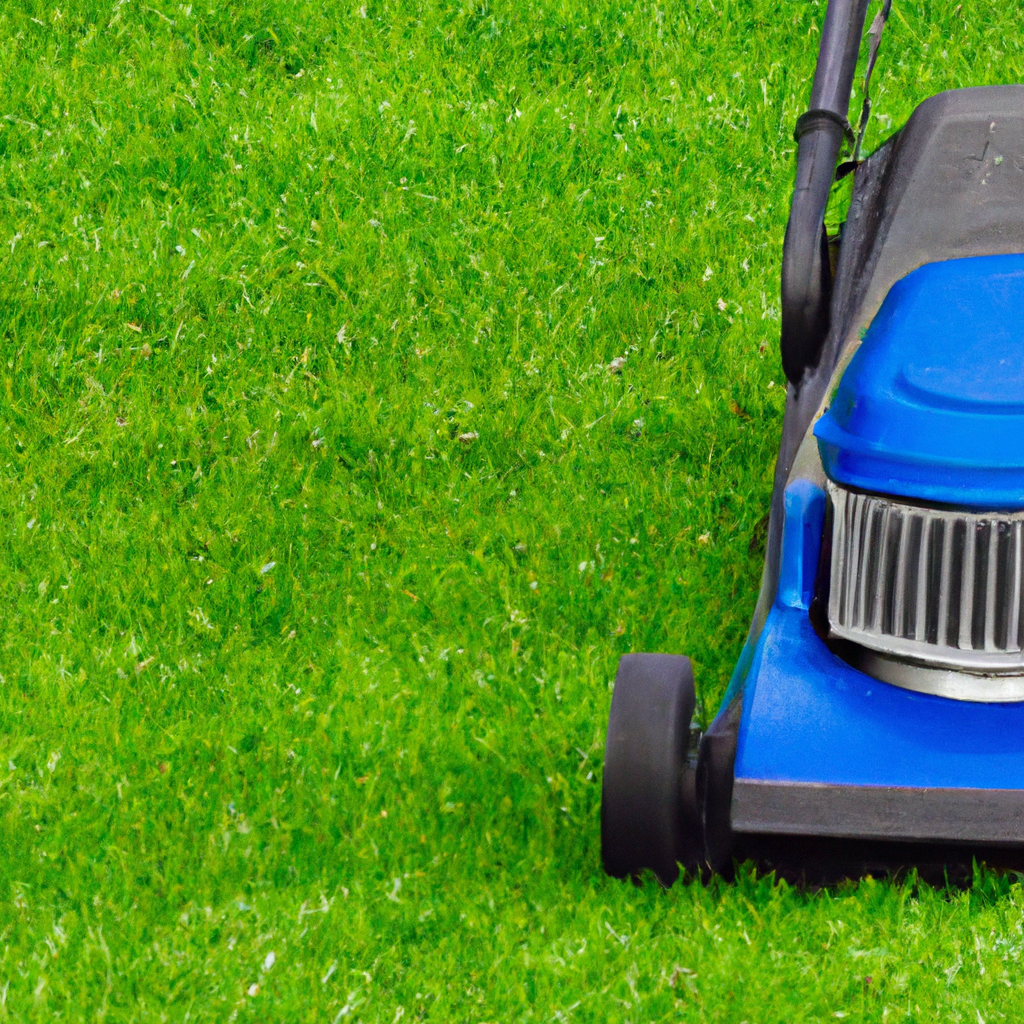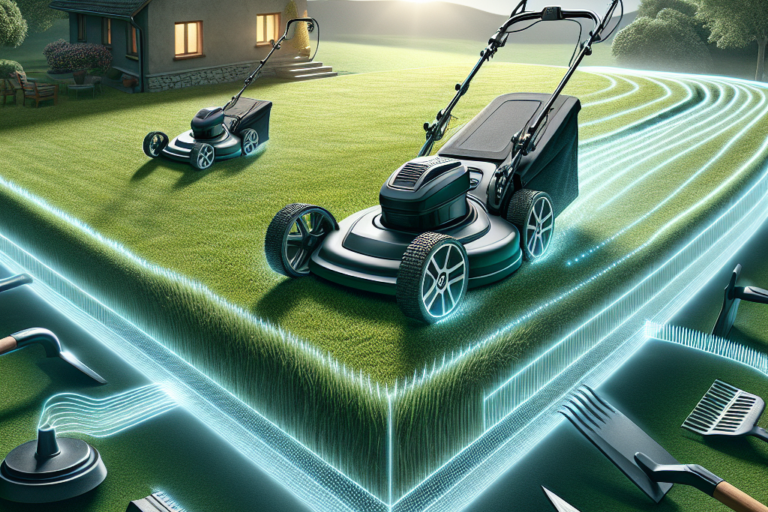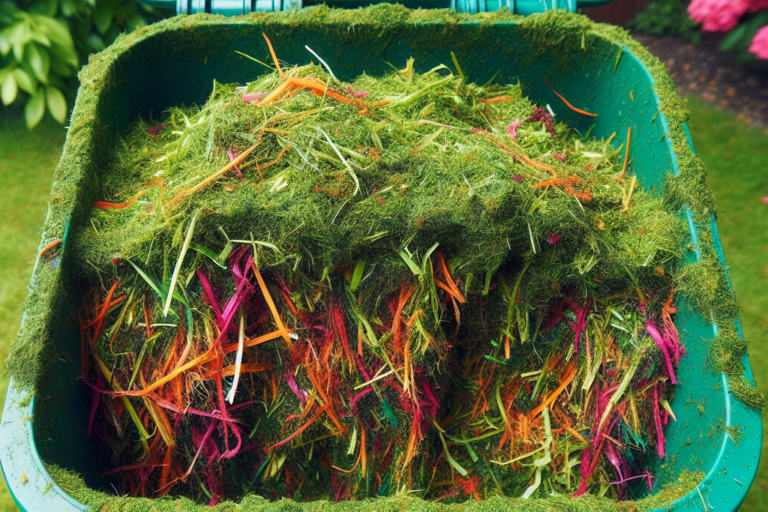Imagine you’re standing in your backyard, looking out at your lush, green lawn that has been recently drenched by a heavy rain shower. With your trusty electric lawn mower ready to go, you can’t help but wonder, can you use it on wet grass? Will it get the job done just as effectively, or will it cause some unforeseen complications? In this article, we will explore the answer to this common question to help you maintain a neatly manicured lawn, rain or shine.

Overview
Introduction
Maintaining a well-manicured lawn is a source of pride for many homeowners. One essential tool in achieving a well-kept lawn is a reliable lawn mower. In recent years, electric lawn mowers have gained popularity due to their eco-friendly nature and convenience. However, a common question that arises is whether it is safe to use an electric lawn mower on wet grass. In this article, we will explore the importance of lawn maintenance, the basics of electric lawn mowers, safety precautions, the effectiveness of electric mowers on wet grass, specialized electric mowers, maintenance and cleaning tips, alternatives to electric mowers, expert recommendations, and common misconceptions surrounding this topic. So, let’s delve into the world of electric lawn mowers and wet grass.
Importance of lawn maintenance
Maintaining a healthy and well-kept lawn goes beyond aesthetics. It plays a significant role in the overall appeal and value of your property. A properly maintained lawn enhances the curb appeal, creates a pleasant outdoor space, and provides a safe environment for various outdoor activities. Regular lawn maintenance includes mowing, watering, fertilizing, and weed control. Consistently attending to these tasks not only makes your lawn look beautiful but also promotes healthy growth, prevents weed infestation, and strengthens the grass root system.
Electric Lawn Mower Basics
Definition
An electric lawn mower is a type of mower that utilizes electricity to power its cutting blades. It is powered by an electric motor, which can be powered either through a cord connected to an electrical outlet or a rechargeable battery.
How it works
Electric lawn mowers use the power from electricity or batteries to drive the blades, resulting in the spinning motion that cuts the grass. The cutting height can usually be adjusted to suit the desired grass length. Electric mowers are typically lighter and quieter than gas-powered mowers, making them a popular choice for homeowners.
Advantages over gas-powered mowers
Electric lawn mowers offer several advantages over their gas-powered counterparts. Firstly, they are environmentally friendly, producing zero emissions during operation. Additionally, they require less maintenance since there is no need for oil changes or spark plug replacements. Electric mowers are generally easier to start, as they don’t require pulling any cords or yanking on a starter rope. Furthermore, they operate more quietly, making them suitable for early morning or late evening mowing without disturbing your neighbors.
Safety Precautions
Importance of safety measures
While electric lawn mowers are generally safer and more user-friendly than gas-powered mowers, it is still crucial to prioritize safety when using any power tool, including electric mowers. Here are some essential safety precautions to follow:
- Read the manual: Familiarize yourself with the manufacturer’s instructions and safety guidelines before operating the mower. Each model may have specific guidelines that need to be followed.
- Wear appropriate attire: Always wear closed-toe shoes, long pants, and safety goggles to protect your feet, legs, and eyes from any debris while mowing.
- Keep children and pets away: Ensure that children and pets are indoors or in a safe distance away from the mowing area to prevent accidents or injuries.
- Check the cord: If you are using a corded electric mower, make sure the cord is in good condition, without any fraying or damage. Avoid running the mower over the cord, as it may cause damage or even electric shock.
Risks of using electric mowers on wet grass
While electric mowers are generally safe to use on wet grass, certain risks should be considered. Wet grass can be slippery, increasing the risk of falls or accidents. Additionally, wet grass can clog the mower’s cutting deck or discharge chute, affecting the cutting performance and potentially damaging the mower. It is crucial to exercise caution and follow proper techniques when mowing wet grass to minimize these risks.
Effectiveness on Wet Grass
Impact on cutting performance
Cutting wet grass with an electric mower can be challenging due to the increased moisture content. Wet grass tends to clump together, making it harder for the mower’s cutting blades to slice through cleanly. This may result in uneven cutting and potentially leave behind patches of uncut grass.
Potential damage to the lawn
Using an electric mower on excessively wet grass can lead to damage, especially if the mower has a low clearance or the soil underneath is soft. The weight of the mower can cause the wheels to sink into the ground, leaving unsightly ruts on your lawn. Additionally, the moisture from wet grass can contribute to the spread of diseases, such as fungus, which can harm the grass and require additional treatment to restore its health.
Proper technique for cutting wet grass
To ensure effective and safe cutting of wet grass with an electric mower, follow these guidelines:
- Raise the cutting height: Set the mower’s cutting height to its highest level to prevent the grass from getting stuck or clogging the cutting deck.
- Mow in multiple passes: Instead of trying to mow large sections at once, make multiple passes over the wet grass. This allows the mower to handle smaller amounts of grass at a time, reducing the chances of clogging.
- Clean the mower frequently: After each pass, remove any grass clippings that may have accumulated on the mower’s deck or chute. This will help maintain the cutting performance and prevent excessive clogging.

Specialized Electric Mowers
Features of electric mowers designed for wet grass
Some electric mowers are specifically designed to handle wet grass more effectively. These models may include features such as higher clearance, wider tires for better traction, and enhanced cutting mechanisms to handle the challenges posed by wet conditions. Specialized electric mowers can be a worthwhile investment if you frequently encounter wet grass or have a larger lawn that requires regular mowing.
Considerations before purchasing a specialized mower
Before investing in a specialized electric mower for wet grass, consider the following factors:
- Lawn size and frequency of use: Assess the size of your lawn and how often you encounter wet grass. If your lawn is relatively small and wet grass is infrequent, a regular electric mower with proper techniques may suffice.
- Budget: Specialized models may come with a higher price tag, so consider your budget and whether the additional features justify the cost.
- Storage capacity: Check the size and storage requirements of a specialized electric mower, as they might be larger or heavier than regular models.
Maintenance and Cleaning
Keeping the mower in good condition
Regular maintenance and cleaning are essential to keep your electric mower in top shape. Here are some necessary steps to follow:
- Sharpen the blades: Dull blades can result in uneven cutting and put additional strain on the mower’s motor. Sharpen the blades regularly to ensure a clean cut and minimize wear and tear.
- Cleaning the cutting deck: After each use, remove any grass clippings or debris from the cutting deck using a brush or scraper. This prevents clogging and rust formation.
- Lubricate moving parts: Apply lubricating oil to the mower’s moving parts, such as the wheels and hinges, to reduce friction and ensure smooth operation.
Preventing rust and damage from wet grass
Since electric mowers are primarily used outdoors, they are exposed to various weather conditions, including wet grass. To prevent rust and damage to your mower:
- Dry the mower after use: If the mower comes into contact with wet grass or moisture during operation, wipe it down thoroughly using a dry cloth before storing it away.
- Store the mower in a dry place: Ideally, store your electric mower in a covered area, such as a shed or garage, to protect it from rain or excessive moisture.
- Use a mower cover: Consider investing in a mower cover to provide additional protection from the elements, particularly during extended periods of rain or wet weather.
Alternatives to Electric Mowers
Other types of mowers suitable for wet grass
If using an electric mower on wet grass poses challenges or concerns, there are alternative options to consider:
- Gas-powered mowers: Gas-powered mowers have traditionally been popular for their cutting power and ability to handle tougher mowing conditions. They perform better on wet grass, but they do produce emissions and require regular maintenance.
- Manual reel mowers: Manual reel mowers are human-powered and do not depend on electricity or fuel. They are a quieter and more eco-friendly option. While they may require more effort to maneuver, they can be effective for mowing wet grass since the blades are less likely to clog.
Expert Recommendations
Opinions of lawn care professionals
Lawn care professionals often recommend caution when using electric mowers on wet grass. While the effectiveness of an electric mower on wet grass may vary depending on the specific model and conditions, it is generally advised to wait for the grass to dry before mowing to ensure a clean and even cut.
Manufacturer guidelines
Manufacturers of electric mowers typically provide guidelines and recommendations regarding the use of their products on wet grass. It is advisable to refer to the specific manufacturer’s manual for detailed instructions on operating the mower in wet conditions.
Common Misconceptions
Addressing myths and misconceptions about using electric mowers on wet grass
There are several misconceptions surrounding the use of electric mowers on wet grass. Let’s address some of the most common ones:
- Myth: Electric mowers are not suitable for wet grass. Reality: While it may present challenges, electric mowers can be used on wet grass with proper precautions and techniques.
- Myth: Wet grass damages electric mowers. Reality: Electric mowers are designed to withstand moisture and operate safely in wet conditions. However, excessive exposure to moisture can contribute to rust or potential damage if not properly maintained.
- Myth: Electric mowers always clog on wet grass. Reality: While wet grass can potentially clog the cutting deck, regular maintenance, and proper mowing techniques can minimize the clogging risk.
Conclusion
Summary of key points
Electric lawn mowers are a popular and eco-friendly choice for maintaining a well-manicured lawn. While using an electric mower on wet grass presents challenges, it can be done effectively and safely with the right precautions. Specialized electric mowers designed for wet grass can offer additional features to handle the unique conditions. Regular maintenance, proper mowing techniques, and following manufacturer guidelines are essential for keeping your electric mower in good condition. Alternatives such as gas-powered mowers or manual reel mowers can also be considered depending on your specific needs. Ultimately, consulting with lawn care professionals and prioritizing safety will help you make informed decisions and enjoy a beautiful lawn all year round.
Final thoughts
Remember, whether it’s wet grass or dry grass, safety should always be your priority when operating any type of lawn mower. Following the recommended safety precautions and maintaining your electric mower will not only improve its longevity but also ensure a beautiful and healthy lawn. So, go ahead and take care of your lawn, rain or shine, with the right tools and techniques at your disposal. Happy mowing!






